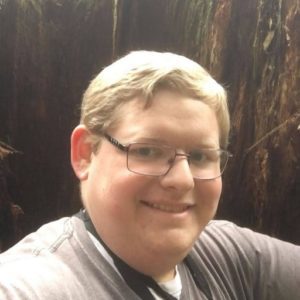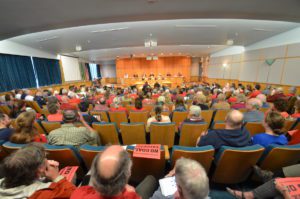 By Jacob Pederson, Clean Energy & Communications Intern
By Jacob Pederson, Clean Energy & Communications Intern
It all started when I was a bright-eyed high schooler in 2016, shocked when I learned that North America’s largest coal terminal might be built atop the ancestral village site and burial grounds of the Lummi people’s ancestors, ashore from their traditional fishing grounds and the important habitat of the Cherry Point Aquatic Reserve. A couple years later when I moved to Bellingham to go to college, this dangerous and polluting project had thankfully been stopped by Lummi Nation asserting their treaty-protected rights—but fossil fuel industries still could freely expand hazardous fossil fuel shipments through their existing terminals at Cherry Point, and I felt the need to speak up and act. So when I got an email alert from RE Sources about a local government hearing that would help protect Cherry Point, known as Xwe’chi’eXen by the Lummi people, I put everything else on hold for the night.
Sometimes, years of tireless involvement in a worthy cause starts with a spontaneous decision to just show up.
At first it was unnerving to stand up and speak in front of everyone, and to look seven council members I’d never met in the eye, but once I started speaking it felt more and more natural. I told them how important it was to me that the sovereignty of the Lummi Nation be maintained through rules that help to protect Xwe’chi’eXen and the Salish Sea from dangerous fossil fuel shipment projects.

A deep care for the indigenous nations and cultures in this region remains the driving force behind my activism to help protect this sacred, ecologically rich swath of land and coastline.
But I had no idea what was in store for the next few years, or how it would change for me what it means to be an engaged community member
The fateful town hall
By the time I got involved, after the coal terminal’s defeat, Whatcom County had maintained a temporary moratorium on permits for facilities that would increase pass-through shipments of unrefined fossil fuels. I quickly learned the moratorium was not the maneuver that would ultimately protect Cherry Point. Rather, it was a set of amendments to the rules for the Cherry Point Industrial District in Whatcom County’s zoning code. That sentence alone is enough to put some folks to sleep, but that’s where the vital work of protecting water, air, and public health is really happening.
 The goal was to strengthen the outdated environmental laws and expand public involvement in permitting processes for new permits at the existing oil refineries, operated by bp — formerly British Petroleum— and Phillips 66, and PetroGas, which mainly ships propane and other Liquified Petroleum Gases (LPG) through existing transshipment terminals. The amendments would also ban new fossil fuel refineries, and new docks, piers, and wharfs to prevent something as dangerous as the coal terminal from being proposed again.
The goal was to strengthen the outdated environmental laws and expand public involvement in permitting processes for new permits at the existing oil refineries, operated by bp — formerly British Petroleum— and Phillips 66, and PetroGas, which mainly ships propane and other Liquified Petroleum Gases (LPG) through existing transshipment terminals. The amendments would also ban new fossil fuel refineries, and new docks, piers, and wharfs to prevent something as dangerous as the coal terminal from being proposed again.
I quickly learned that the Council had been working on these amendments for about five years, taking input from industry and organizations like RE Sources. The conflicting interests revealed themselves almost immediately.
I interned at RE Sources and attended the first town hall meeting about the amendments. I realized how quickly things can get heated in the Council chambers (and some time later, how it doesn’t have to be that way).
That night, the Whatcom Planning Commission heard seven hours of rhetoric dominated by the industry saying that their voices hadn’t been heard and that their jobs were in danger. These were legitimate concerns, but I was worried that the amendments were about to be weakened, and I was right
A future worth standing up (and sitting) for
Before the County Council could even think about approving these new protections for Cherry Point, the amendments had to slog through the County Planning Commission. The Planning Commission held extremely long, grueling meetings going over every detail of the amendments for close to a year. And I attended them all.
You might be wondering “how did he do it?” Firstly, the green velvet movie seats in the Council Chambers were very comfortable. But even more importantly, I kept imagining Cherry Point and how beautiful its land, waters, and pristine beaches are to remind myself about why I was listening to hours of commissioner discussion and hours of testimony by industry experts (and the occasional treat of hearing my internship supervisor, Eddy Ury, Climate & Energy Policy Manager at RE Sources, getting up to speak for community safety and environmental protection).
You might be wondering “how did he do it?” Firstly, the green velvet movie seats in the Council Chambers were very comfortable…
I was there because the outcome meant so much to me. And that’s what I recommend for those of you that are interested in getting involved in local issues; whenever you get bored or discouraged by the way the process is going, take a minute and visit the utopia you envision when the policy is passed, and the people and place you love is safe.
Needless to say, my “utopia” of a clean, protected Cherry Point looked pretty bleak at first. I watched as the Planning Commission heavily favored industry’s input and removed proposed rules about limiting greenhouse gas emissions, and whittled the insurance requirements in case of an oil spill or oil train derailment down to a simple rule that industries disclose insurance coverage to the county.
At those meetings, community members didn’t have a chance to get up and speak, so I submitted written public comments. Of course, in most cases they didn’t utilize my input. But in several instances, they apparently did. The fact that they listened at all was encouraging, but I also went through moments of suspense and despair as they made changes or cuts that I didn’t agree with.
I learned this give and take is part of the public process, where many voices and perspectives have to be reconciled into a single policy that works for as many people as possible. Even though everything I said wasn’t acknowledged, if I hadn’t said it all—if others who shared my views hadn’t backed me up—I would have had no chance to have parts of my beliefs and values captured in the final policy.
 Throughout the Planning Commission Meetings, I also learned that my understanding of the draft amendments—and of public policy in general — as “perfect” was extremely flawed. The industry pointed out problems that both made business harder for them and undermined the goals of the County Council and environmental groups. I was shocked by this, especially since the Council had hired a professional law firm to help them write it in a way that was within legal bounds.
Throughout the Planning Commission Meetings, I also learned that my understanding of the draft amendments—and of public policy in general — as “perfect” was extremely flawed. The industry pointed out problems that both made business harder for them and undermined the goals of the County Council and environmental groups. I was shocked by this, especially since the Council had hired a professional law firm to help them write it in a way that was within legal bounds.
I learned the refinery workers had something county officials and lawyers didn’t have: an integral knowledge of the way their facilities work and what laws they are bound by. Such knowledge, it seems, can only come from working at a facility for many years.
I ultimately learned that refinery workers and environmental advocates aren’t all that different. We both want a healthy planet and jobs that allow people to thrive and provide for themselves and their families. So, the key to a successful campaign or policy is finding the common ground, not about one side dominating the other. Luckily for this process, I wasn’t the only one who figured that out.
Stakeholder convenings: Where the magic happens
Ever since I met him two years ago, Eddy Ury, the Climate & Energy Policy Manager at RE Sources, always impressed me with his ability to get along with everybody. So, it wasn’t very surprising that he was instrumental in bringing together a diverse group of industry representatives, labor unions, contractors, and environmental groups to help Whatcom County write the amendments in a way that achieved everyone’s goals.
These stakeholders have continued to work on the language to make it clearer and more protective for the environment than the original draft, while clarifying outdated rules on industries, allowing them to continue providing and adding jobs.
I’ve been to several of these meetings, and I’d say that they’re my favorites out of the whole process. The main thing I love about them is that everyone’s so civil to each other, and the discussions are intelligent and rational. It’s a far cry from the superheated Town Hall a year ago where neither side got anywhere.
The public process is messy, but it works—especially when all people affected are heard from and considered.
Hopefully I’m not being overly optimistic when I say that these protections for Cherry Point will be approved soon, and the countless hours of hard work by all sides will finally pay off more than I could have imagined when I first got involved.
The public process is messy, but it works—especially when all people affected are heard from and considered. The alternative is heated debate that grinds policies to a halt, and blindspots in those policies that prevent them from doing what they’re supposed to, because no one group has a complete understanding of the issue they are trying to address. It takes multiple backgrounds and multiple ways of understanding the world and its complexities to get the whole picture and tie down loose ends in a given policy.
Most importantly, I learned that the more people speak up, the more elected officials listen. Even if you just sit and enjoy the fancy government furniture, it helps to show that members of the public are paying attention to their decisions. That is why I encourage everyone, no matter what you believe, to try participating in whatever local issues you care most about—and make your voice and perspective part of the conversation.
